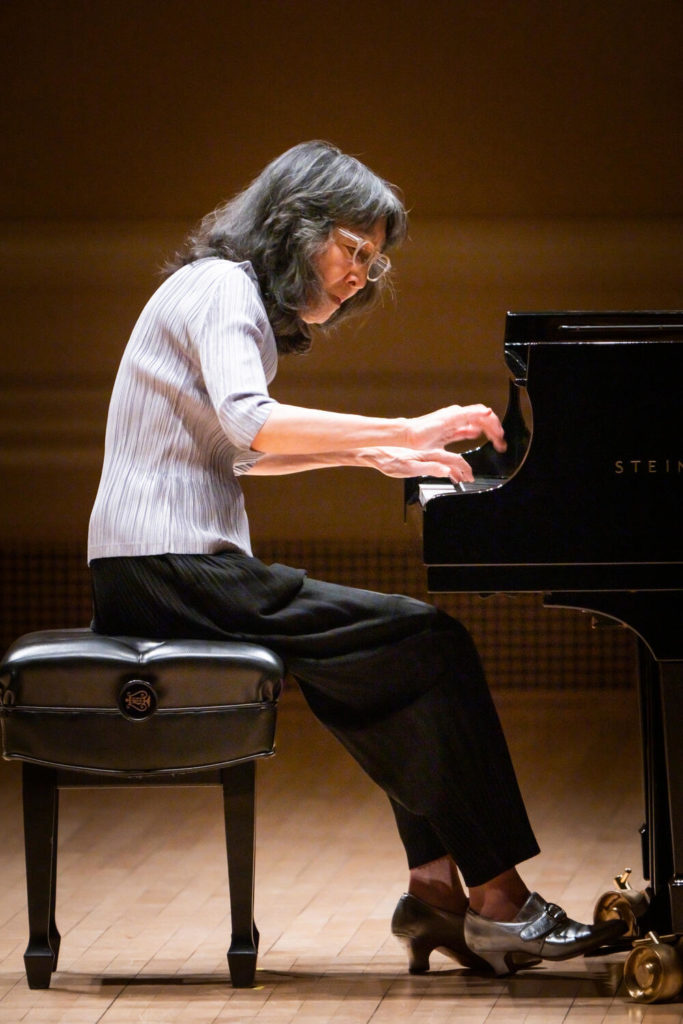Uchida’s artistry shines even through stumbles in Beethoven recital at Carnegie

Mitsuko Uchida is at the front end of a multi-season Perspectives Series at Carnegie Hall, essentially allowing her to play what she wishes. It’s an ideal situation for both her and audiences alike — Uchida is a truly great artist. More than a superb pianist, she is a deep musical thinker with an added gift of personality that lets her express herself and simultaneously disappear inside the music. She has the type of artistic humility that comes from assurance and carries absolutely no pride in itself, no self-regard. That’s a rare thing.
Friday night at Carnegie Hall, Uchida played some of the most personality-heavy music in the repertoire, Beethoven’s final three Piano Sonatas. Much of this concert was just what one would expect, the kind of playing where one senses the music coming as naturally as possible, the very idea of interpretation irrelevant before what sounds transparently like the only way these sonatas could possibly sound. It was a marvelous, entrancing sensation, though one that several times was shattered by surprising and disconcerting flaws in Uchida’s playing.
Sixty years after her first recital, she is as graceful as can be at the keyboard, with flowing legato technique and a supple logic in phasing. This is less intellect than sheer musicality: one never hears the seams and joints of structures and sections; instead it’s just a long, integrated thread of notes that combine in every way. The transparency in Uchida’s playing is that she hears so clearly she makes audiences hear the same way.
This clarity was best demonstrated in the opening movement of the E Major Sonata No. 30, with its willful abandonment of one musical idea for another, its impulsive modulations. Uchida made these shifts all sound as part of a complete whole, even as the movement strode with complete determination and commitment from idea to idea. It was playful but low-key.
Usually, nothing sounds difficult under her hands; she makes everything easy, comprehensible and sensible. She missed some notes in the Prestissimo, but that seemed inconsequential. Everyone misses notes; what matters is whether or not it interferes with the playing. In this instance, it did not. But problems accumulated later, in the final movement, which in the slow passages was as singing as could be, whereas in the fast variations, brief hesitations and awkward moments felt like tripping on cracks in the sidewalk.
Uchida’s judgment was wise as always, and her intent was equally as clear, but her hands were not always able to do what her mind asked of them. The opening movement of Sonata No. 31 was wonderful and gentle, with substantial drama underneath, Uchida’s left hand seeming to probe what mysteries might lie there. But in the fast middle movement there were stumbles that interrupted. Even when she deliberately prepared her attack on specific chords, one came out with a key audibly mis-hit, and the very preparation made the error more acute.
The adagio opening of the final movement was gorgeous, exceptionally graceful, and Uchida’s ability to play softly and without mannerism expressed an enormous yet weightless sense of beauty. But again, hints of clumsiness damaged the faster music in the fugue.
Sonata No. 32 came after intermission. Uchida played the opening with a forward-looking feeling, more interested in the drama of Beethoven’s harmonic motion than underlining and specific emotional content, and this built up excellent Beethovenian tension. Next comes a torrent of notes and ideas buffeting between riot and repose. Uchida at times had to push through still more awkward and clumsy moments, distractions that left a listener bracing for the possibility of more stumbles. The audience experience, depending on the pace of the music, swung between relishing the expression and rooting for the pianist to make it through.
Beethoven’s final sonata concludes with some of the most extraordinary composing in all of classical music, and because it doesn’t pose the same technical hurdles as Nos. 30 and 31, Uchida’s playing was as compelling and meaningful as one could have imagined.
The opening theme was delicate yet still plangent, and Uchida’s long intellectual and emotional ruminations of the repeated arpeggios and trills of the extended cantabile section were equal to the composition. Her thinking, her playing at soft dynamics and her ability to play with legato phrasing and precise articulation were absolutely luminous.
This was the core of Uchida’s specialness, an expression that eschewed obvious poetic ideas for something that seemed both as simple and as right as possible, and by doing so opened up the incredible range and depths of the music. It sang to the end, where Uchida listened to the final sounds fade, her head bowed over the keyboard.
Mitsuko Uchida and the Mahler Chamber Orchestra play Mozart and Schoenberg, 8 p.m. March 9 carnegiehall.org



Posted Feb 26, 2023 at 4:30 pm by Stephen Essrig
A perfect review. While some of those dropped notes were a little disconcerting, the overall conception was extraordinary. I have one quibble: given the power and intensity of her performances, it might be better not to play all three of the late sonatas on one program, since they require so much concentration from the listener. Apart from that, an incredible evening.